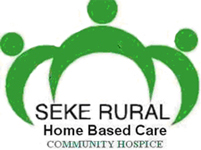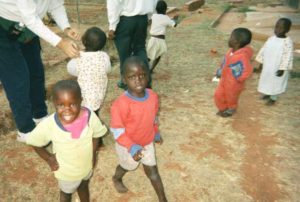Our ambassador for Zimbabwe Ruth Mazarura explains some of the work been carried out by her organisation to help older people support young children affected by HIV.
“I am grateful for the exposure that I got from attending the ACSA/IAHSA conference of 2015. The seed that was planted in me that of wanting to see the lives of older people improve is growing it was not in vain.
When I attended the conference, I had just changed jobs to work for an organisation that was working for the welfare of children. I work for an international organisation whose main function has been to support community based organisations (CBOs) who are supporting orphaned and vulnerable children to get tested for HIV, enroll onto care and treatment, and to provide nutritional, psychosocial and adherence support.
Most of these children are looked after by grand parents who can barely look after themselves
Zimbabwe is one of the Sub Saharan countries in Africa which has been hard hit by the HIV pandemic. Even though the prevalence rate has been dropping from 25% to 14.9%, the wounds and scars from that era are still very visible today. Due to the HIV pandemic, the middle age generation was eroded leaving orphans behind.
The older people, instead of enjoying their old age, are faced with many challenges in Zimbabwe, among them is looking after orphaned and vulnerable children. There are many issues that come with looking after orphaned children namely:
- Sending children to school and paying for their school fees. Sending children to school can be a challenge in Zimbabwe where education is not free. Government have tried to subsidise the provision of education but it remains a challenge for older people to raise the minimal fee requirements
- Providing shelter for the children.
- Paying for their medical fees. Public sector which is supposed to provide primary care is stretched and not able to provide the services. Medical facilities demand a minimal fee for them to remain viable which the older caregivers find very difficult to raise.
- Providing food – while the older people in Zimbabwe are very hard working, the weather has not been kind. The country has suffered the effects of El Nino causing devastating drought that has left the country especially the rural areas with no food. Most rural areas have been depending on food-help programmes which are sporadic. While the younger population has resorted to cross border trading, the older persons have remained stuck in poverty not being able to fend for these children
- Proving parenting and guidance – raising a child requires a certain amount of energy which the older persons do not have. The older persons have a duty to raise these children to be responsible adults, a responsibility that is too huge for the older care givers.
 Seke Rural Home Based Care (SRHBC) is a local NGO operating in Seke, Wedza and Marondera Districts in Mashonaland East Province and Makoni District of Manicaland Province providing care to the children and people living with HIV. Their core function has been to provide holistic care to those affected and infected with HIV through the provision of physical, medical, nutritional, social, mental and spiritual care.
Seke Rural Home Based Care (SRHBC) is a local NGO operating in Seke, Wedza and Marondera Districts in Mashonaland East Province and Makoni District of Manicaland Province providing care to the children and people living with HIV. Their core function has been to provide holistic care to those affected and infected with HIV through the provision of physical, medical, nutritional, social, mental and spiritual care.
The organisation works with 977 HIV infected children, 90% of which are from granny headed and child headed families because their parents are deceased.
SRHBC has engaged a number of ways to try and help curb the problem by the grannies. Initially there was payment of school fees for some of the children but due to limited funds, only a few children could be assisted and the solution was only for the time when there was funding. The organisation also introduced giving transport fares to go and collect their ARVs but also this was not sustainable since funding is always for a short period.
The organisation then resorted to economically strengthening these older persons through the use of Internal Lending and Savings Scheme (ISALs) programme supported by World Education Inc. The ISALs programme teaches the older people how to manage finances and to put them to good use specifically for use to meet the needs of children. They contribute as little as 50 cents per week depending on affordability and are able to borrow from the funds to start income generating projects like buying and selling.
This has enabled many to be able to provide for basic needs for these vulnerable children. Children have been able to go to school and to the health facilities for health issues at the same time. The grand parents have been able to also buy nutritious foods for the children. Some have managed to keep chickens for eggs and goats for milk which they sell when there is need to buy any items for the children.
The organisation has also facilitated the formation of caregiver support groups where they share experiences of looking after orphaned children and learn from one another. This has been used as a platform to encourage children adherence to their HIV treatment as they are responsible for the children medication. Some of the older people are HIV infected themselves, being in a support group helps them to get the psychosocial support they need. The support groups are facilitated by trained community health workers in collaboration with health workers from the health facilities.
Pass on the Gift Program
SRHBC also introduced “Pass on the gift” program making use of chickens and goats and benefitting a total of 187 households. A granny headed family would either get 2 hens and a cock or a male and a female goat. Those who received chickens were supposed to look after them where the hens would lay eggs and hatch them normally within the same year. No matter how many chickens would be produced, they were expected to pass on just two hens and one cock to the next granny headed family the following year. The rest would be for their own household use as source of protein from the eggs and meat from off layers and for producing more chickens.
For those who would have received goats, they were expected to give away the first female and the first male goat to another granny headed family. This strategy helped greatly to improve the diets for these granny headed family since they could now eat first grade protein, something that they used to dream of. However since these households are very poor, some consumed the chickens and goats or sold them to get school fees or pay for medical bills for their grandchildren.
Even though SRHBC is making frantic efforts to assist the older people in their community, they have not been able to engage all older people. Some older people find it difficult to engage in income generating projects as they are frail. The projects try to provide them with assistance but to a smaller scale. Funding come and go, this has affected the continuity of these projects that were very helpful to the older people. However as an organisation, SRHBC continue to source for funding to help these caregivers so that they can look after the vulnerable children.”

